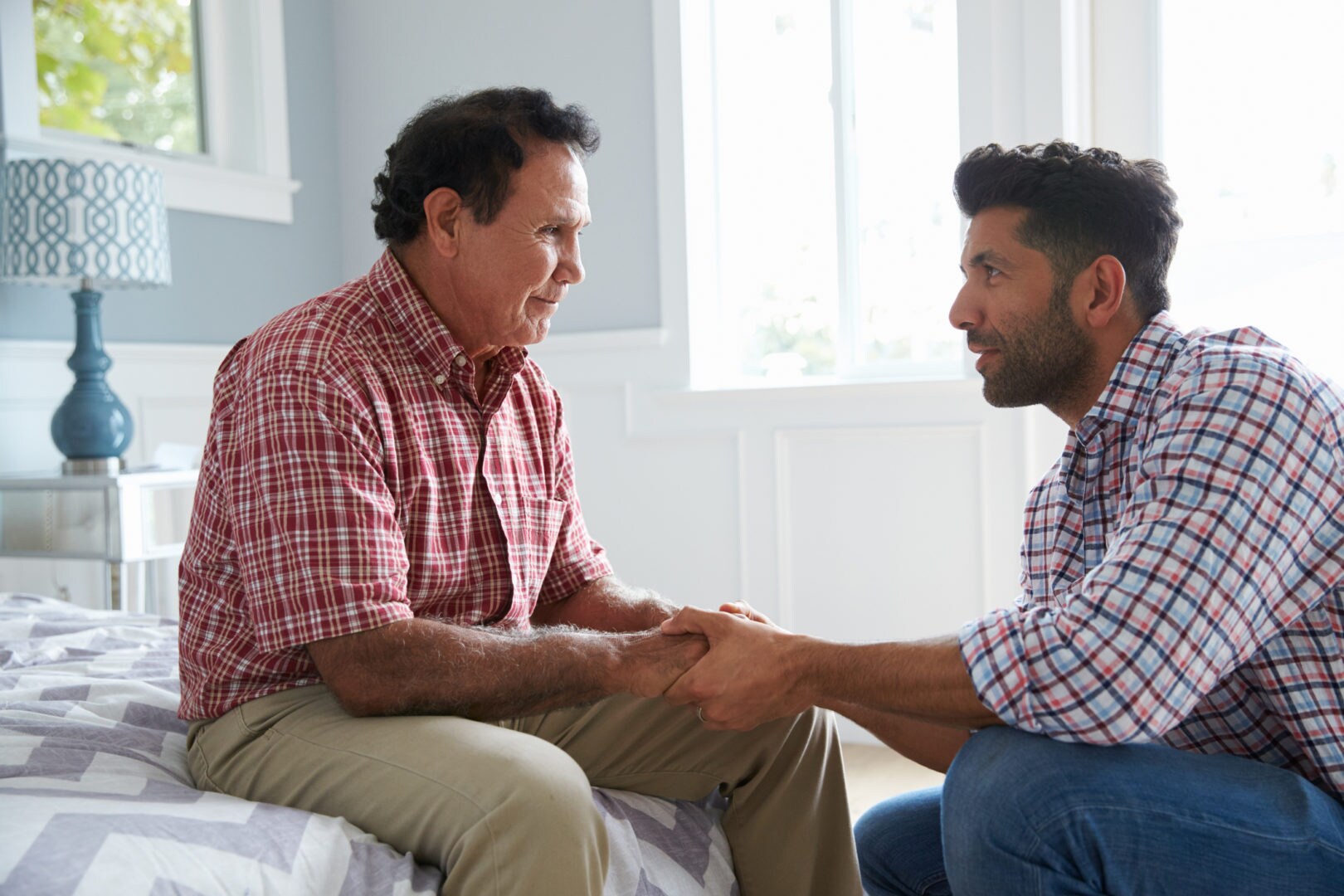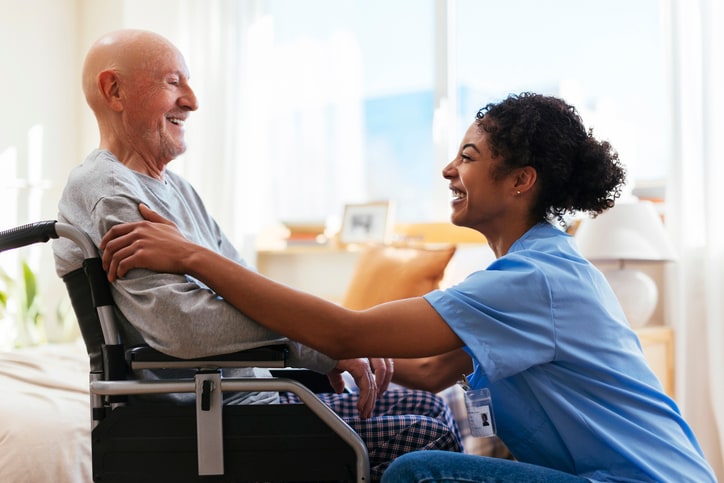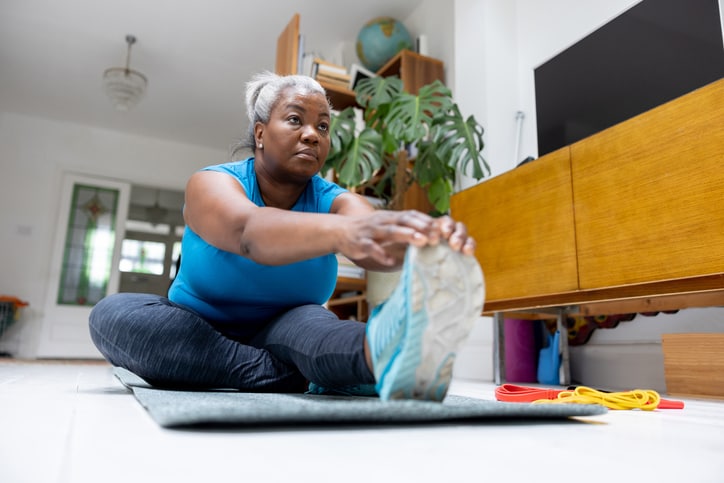Caregiving can be exhausting and isolating, particularly if your loved one is suffering from cognitive impairments. “Caregivers tend to put their own health and their needs aside when they’re caring for someone, especially those living with Alzheimer’s disease or another dementia,” says Monica Moreno, the senior director of care and support at the Alzheimer’s Association. She urges caregivers to “recognize that you don’t have to do this alone, and there are resources available and people in your community willing to help you.”
Moreno acknowledges that asking for help can be challenging, and new caregivers often start researching online and quickly get overwhelmed. For that reason, she says, the Alzheimer’s Association aims to make their website a one-stop shop with trusted information and resources on Alzheimer’s and other forms of dementia. As you look for more support for yourself and your loved one, consider these other resources for Alzheimer’s caregivers and more.
“Recognize that you don’t have to do this alone, and there are resources available and people in your community willing to help you.”
—Monica Moreno, senior director of care and support at the Alzheimer’s Association
How to build your Alzheimer’s and dementia care team
When it comes to a disease as complicated and life-changing as dementia or Alzheimer’s, “sometimes we think of the caregiver as one person, but the reality is it’s often a whole group of people,” says Dr. Jennifer Reckrey, associate professor of geriatrics and palliative medicine at the Icahn School of Medicine at Mount Sinai in New York. “One person isn’t going to be able to do it all, so I encourage really creating a community of caregivers to help.” So, in addition to family and friends, who are the people you consider getting in your corner?
A trusted physician
If you have concerns your loved one may be developing dementia or Alzheimer’s, and they already have a good relationship with their primary care doctor, they should see them before other specialists, Reckrey says. A geriatrician with experience caring for dementia patients is also a wonderful option, she says, but they’re not available in every area.
She believes in prioritizing an existing relationship with a doctor over specific training, as long as the doctor is knowledgeable and has experience working with people with dementia. Depending on the situation, the doctor may refer the patient to a neurologist for a more thorough evaluation, she notes
Either way, Reckrey says it’s key to find a doctor who makes you feel supported as your loved one’s disease progresses. “A good doctor recognizes the importance of the caregivers and engages them,” she points out. They also know that being there to answer the caregiver’s questions will make it possible for the individual with dementia to stay healthy and stay at home, Reckrey says.
Home health aides
Cognitive impairment can impact every aspect of daily life. If your loved one begins to need help with day-to-day tasks, such as dressing, bathing, hygiene or eating or simply needs someone to keep an eye on them, it may make sense to hire a home health attendant or aide. In some cases, Medicaid or long-term-care insurance pays for these in-home caregiving services, says Reckrey.
Geriatric care manager
If you’re overwhelmed trying to assess your loved one’s needs and how to meet them, one option is to hire a geriatric care manager, Reckrey says. “It’s usually a social worker or a nurse who specializes in geriatrics, and there’s licensing for them,” she explains. “People pay out of pocket for this, so it’s not available to everyone, but it’s an option for somebody who wants some help understanding what’s out there and what they should be thinking about.”
Financial and legal planners
With a dementia diagnosis, it’s a given your loved one’s needs will change over time, so Reckrey recommends being proactive when it comes to financial planning and legal planning. Finding experts and getting plans in place as early as possible not only gives you a greater opportunity to get input from your loved one, but it also helps prevent crises down the road.
Local resources to consider
In-person Alzheimer’s and dementia resources for caregivers range significantly by location. These trusted hubs offer databases that compile local resources (such as those mentioned above and many more), and they’re searchable by location.
Eldercare Locator
The federal government offers plentiful resources, such as the Eldercare Locator website, recommended by both Moreno and Reckrey. This hub is chock-full of useful tools, including resources by area, links to information on benefits and support services, primers on elder rights and a team of support specialists you can contact for further assistance.
Alzheimer’s Association + AARP’s Community Resource Finder
Alzheimer’s Association, in partnership with AARP, has an online resource directory categorized by need. Whether you’re searching for in-home care, specialized doctors, housing options or community services, you can select the category you need and type in your location to see recommended resources near you. Moreno notes that the tool allows you to save your list of resources and share with others, such as family members who are involved in caregiving.
Your state’s department on aging
Most states have a department on aging that serves as a central hub of resources and information for older residents or those who care for them.
The names of the agencies and services they offer vary quite a bit by state and its funding, Moreno says. But these organizations can help you understand what benefits and resources are available in your state. The Department of Health & Human Services has a list of all state aging agencies.
FindHelp.org
FindHelp is a curated database of resources by Aunt Bertha, a network that connects people seeking help and verified social care providers. Once you enter your zip code, you’ll be taken to a list of assistance by categories, such as housing, food, transit, money, legal, health and care. It’s not specifically geared toward dementia or senior services, but each of the categories have sub-sections that make it easy to find relevant resources and programs for older adults.
How to find support for yourself
It’s easy to focus on your loved one and their needs, but don’t forget that you need support and help too. These resources exist to help caregivers like you.
Alzheimer’s Association helpline
One of the simplest resources for Alzheimer’s caregivers is the Alzheimer’s Association’s free helpline (800-272-3900). It’s available to anyone who needs information or advice on Alzheimer’s or other forms of dementia at any stage. It’s staffed 24/7 by specialists who provide confidential support in over 200 languages.
Moreno says this resource is there to help with both long-term and immediate needs. “We can answer very basic questions about the disease, but we also have master’s-level clinicians who can provide crisis counseling or intervention over the phone,” Moreno explains.
She adds, “These are families who are encountering a situation where they just don’t know how to handle them and need to speak to a counselor and get direction and guidance and help to build a plan to adjust the current situation they’re dealing with.” For example, Moreno explains, if your loved one is severely agitated in a sundowning episode, you could call and get expert guidance on how to calm them down, plus learn communication techniques you can use in future situations.
Support groups
Caregiving for someone with dementia or Alzheimer’s is an ongoing learning process, since you’re constantly dealing with new challenges as the disease progresses, Reckrey says. “So many families are dealing with the exact same thing and are in the same boat,” she says. For that reason, support groups, like those offered by the Alzheimer’s Association, can be great, according to Reckrey.
These groups once met in-person but have been offered virtually since March 2020 due to the pandemic, says Moreno. The organization has 77 chapters nationwide, which offer free support groups and training for caregivers. If there are no chapters near you, you could ask your loved one’s doctor or your state’s agency on aging if there are support groups in your area they recommend.
Respite care
Respite services provide caregivers with relief by temporarily taking over caregiving duties, giving the primary caregiver some time for themselves. These services can be incredibly valuable resources to caregivers who don’t get enough help from their support system and need a break. There are a huge variety of options out there, Reckrey says, from bringing your loved one to an adult day care center to having in-home attendants who watch them while you handle your other obligations. ARCH National Respite Network has a respite care locator that lists all types of respite offerings by area.
Being the primary caregiver for someone who has Alzheimer’s or dementia isn’t for the faint of heart. But keep in mind that you are far from alone. By reaching out to any number of these resources for caregivers, you will can make a plan and get a support system in place.





